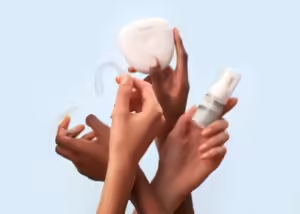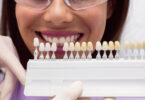Do you grind or clench your teeth at night? This is a troubling issue that many people suffer with. It’s not only annoying, but it can lead to serious dental as well as wider health issues. Your dentist may recommend the use of a night guard to address this issue. The following are some reasons you should consider wearing a night guard.

Photo by Diana Polekhina on Unsplash
What Are Night Guards?
Night guards are therapeutic devices that are placed in the mouth at night. There are a variety of options available on the market, from custom night guards and over-the-counter to boil and bite.
Getting Fit For a Night Guard
If you want a custom night guard for clenching, we recommend that you see your dentist before exploring your options. You can either go through your dentist to get a custom night guard or opt for a more affordable option by purchasing from a direct-to-consumer dental lab online. Both processes require getting impressions of your teeth. The impression is then sent to a lab and a personalized night guard is prepared. The device can be made out of acrylic, silicone or other materials.
Night Guards You Can Buy in Stores or Online
There are several ways to buy night guards over-the-counter or online.
- Stock: These are worn right out of the box, and no adjustments of any kind have been made to them.
- Boil and Bite: The material is boiled and then you insert it to the shape of the teeth. Although these are somewhat customized, the end-product will not fit the user’s mouth as perfectly as a custom-fit night guard that is made by a dental lab.
- At-Home Impression Kit: You take the impression yourself and send it to a lab.
Sports Mouth Guards vs Night Guards
Sports mouth guards and night guards are similar in appearance but have distinct purposes. Mouth guards are worn by athletes to avoid any injuries to the teeth and jaw. What they do, in essence, is shield your mouth from impact. They’re commonly used in sports such as boxing, hockey, rugby and gymnastics.
Night guards are worn while you sleep so that you don’t clench or grind your teeth. These are considerably lighter and not as bulky as sports guards. Wearing a sports mouth guard at night can cause unwanted effects such as sleeping disorders, facial pain, and modification of your bite.
Advantages of Night Guards

Photo by Candid on Unsplash
Treats and Prevents TMD
Many people suffer from TMD or temporomandibular disorders. Common symptoms of TMD include jaw and facial pain, locking of the jaw, and even pain in other areas such as the ears or head. TMD has many causes but it’s often made worse by tension and teeth grinding. Using a night guard often helps to alleviate symptoms.
Helps You Sleep Better
Getting enough sleep is a crucial aspect of your overall health. Issues such as teeth clenching in the night can interfere with your sleep. If you have a disorder such as sleep apnea, you may feel tired during the day due to a lack of quality rest.
A night guard doesn’t necessarily cure every type of insomnia, but it can improve sleep quality. It reduces clenching and grinding, allowing the jaw muscles to relax. This can help you sleep more soundly through the night.
Helps Prevent Snoring and Sleep Apnea
Both snoring and sleep apnea can lead to serious health problems such as heart disease. Snoring is often dismissed as a minor annoyance, especially to others sleeping nearby. However, if you snore regularly, it suggests an obstruction in your breathing that can be serious.
In sleep apnea, breathing starts and stops irregularly. There are home tests to diagnose sleep apnea. Night guards help to free the airwaves while you’re sleeping, making it easier to breathe. It’s important to seek medical advice if you have sleep apnea or snore regularly. While night guards can help, some cases may require additional treatments.
Prevent Future Dental Issues
Grinding your teeth night after night can cause chipped and broken teeth, damaged fillings, and the corrosion of teeth. Damaged teeth affect your appearance, comfort, and ability to chew. They also lead to expensive dental problems down the road. Using a night guard can help save you this kind of distress.
Tips to Get the Most From Night Guards
If you want to gain the maximum benefit from night guards, keep these guidelines in mind.
- Use custom-fit night guards, instead of boil and bite or non-custom options. Aside from being sure it will fit properly, it’s always best to get a professional opinion before buying any kind of therapeutic device.
- Give yourself a chance to get accustomed to a night guard. Putting an object in your mouth overnight feels unnatural. If you find it awkward at first, give it a chance. It may take a few nights to get accustomed to it.
- Put the night guard in your mouth about half an hour before going to bed. This will give your mouth time to adjust.
- Keep your night guard clean. Rinse it with water every morning after you take it out. Then give it a cleaning with a toothbrush. Keep it in a dry place during the day. Never soak it in liquid.
- Visit the dentist regularly. Visiting a dentist every 6 months is important for maintaining your dental health. Your dentist can track your progress and make sure the night guard you’re using fits properly and is doing its job. The dentist will also tell you when it’s time to replace the night guard.
Night Guards: A Simple Way to Improve Your Health
Millions of people have benefited by using these simple but powerful dental devices. Opening your airways while you sleep not only protects your teeth but can also improve your overall health. You may sleep more soundly and prevent potentially dangerous conditions such as sleep apnea. If you aren’t sure if a night guard is right for you, ask your dentist.
Author’s Bio:
Aaron Smith is an LA-based content strategist and consultant in support of STEM firms and medical practices. He is an advocate for dental care and is a true believer in custom night guards to help with various dental concerns.








